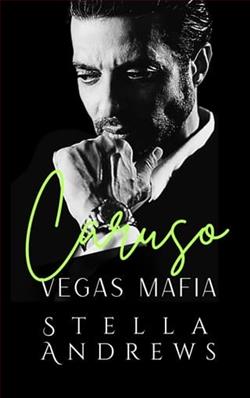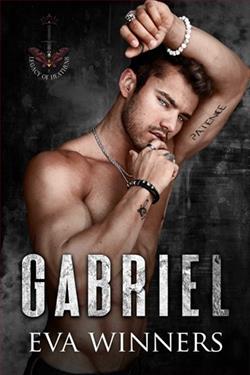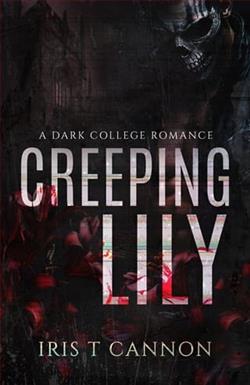Page 10 of A Court of Sugar and Spice
Louisa and I spent most of the day wandering the gardens or browsing the library shelves. I knew if we spent too much time around Drosselmeyer, my sister would be tempted to ask him questions, and we can’t afford to raise his suspicions—not if we’re going to discover the truth of all this.
Fortunately, after breakfast, Drosselmeyer went up to his workshop on the third floor. We haven’t seen him since then—except once, when he came down to let in some florists, workers, and serving girls, all hired for tonight’s party. They’ve been working alongside the automatons to prepare the house, and none of them seem to think anything strange about the moving puppets. I suppose Drosselmeyer’s reputation as an inventor has spread throughout the countryside, and that’s as much as most people care to know.
It’s strange to me how many people can see the wonder of a thing and simply accept it, without inquiring why it was made or how it works. Yet as Louisa and I stand near the staircase, beside an urn overflowing with scarlet poinsettias, wintergrass, and snowbloom, I see it over and over—people gliding into the house, exclaiming delightedly over the automatons and taking drinks from the trays they hold, without questioning the puppets’ presence at all.
In fairness, I did nearly the same thing. I questioned the puppets’ existence internally, but then I let it go. I won’t make that mistake again.
“This party is so fabulous, isn’t it, Clara?” Louisa whispers. Once several guests have arrived, she dances off to mingle with them, chattering merrily to perfect strangers as if she has known them all her life.
If only I had such a gift.
The new arrivals greet Drosselmeyer at the door, pausing briefly while he gestures politely to me and says, “Allow me to introduce my ward, Clara.”
I smile and give a little curtsy, and the guests acknowledge me with a nod, a bob, or a bow of their own. Beyond that, I don’t attempt conversation, so they pass on, taking their drinks from the automatons and moving into the other rooms of the house, which are all open and brightly lit, smelling of cinnamon, apples, and spiced punch. We are nearing the midwinter holidays, and signs of the season are everywhere.
I gaze around the foyer, wishing I could depict all of this in my own style. I’d do a panoramic painting of the entire scene on huge canvases, and then I’d create smaller still-life vignettes, focusing in on the exquisite details—the drape of evergreen boughs, the glow of ruby-red berries, the hazy gaslight on the edges of gilt frames. An elegant beringed hand sliding down the banister. The curl of a man’s hair against his collar.
I don’t dare bring my sketchbook and pencils downstairs. But in my mind, I try to capture each image and save it for later.
Once everyone has arrived, we transition to the dining room, where we’re served a delicate soup of winter squash, tiny potatoes drenched in butter and sprinkled with herbs, succulent slices of duck breast, garlic-buttered mushrooms, glazed carrots, soft bread rolls, and rich cakes topped with syrupy nuts and fruit. It’s all delicious, but I can barely enjoy the food, because I’m too busy sneaking glances at Godfather Drosselmeyer.
He certainly doesn’t look like an infamous Fae hunter, in his slightly untidy suit and shiny spectacles. He looks like a reclusive yet modestly charming inventor—affable, humble, and likable. Not the type of man who would turn living beings into his slaves.
But the objects in the hidden gallery certainly looked rather otherworldly, even Fae. And unless Louisa and I were the victims of a strange shared dream, complete with tactile sensation, the Nutcracker actually came to life last night and told us he was a Fae Prince.
Louisa doesn’t seem bothered at all by the possibility that a Fae realm might exist. She’s happily ensconced between a rotund, pleasant-looking gentleman in his thirties and a pimply young man with bulging eyes. Both seem very eager to monopolize her attention.
Finally, Drosselmeyer signals the end of the interminable dinner by rising, laying down his napkin, and saying, “Ladies and gentlemen, I know you’re all eager to see what I’ve been working on this year. We’ll go and observe my creations now, and I’ll demonstrate some of them as well. There will be a silent auction for these pieces, but remember you can also place orders with my factory across the river in Surrach.”
Everyone rises from the table, chattering excitedly. They pour out of the dining room and down the hall in Drosselmeyer’s wake.
Louisa appears at my elbow. Somehow she divested herself of her two admirers. “We’ll wait until they’re all fascinated by something he’s showing them,” she murmurs. “Something flashy. While they’re occupied, I’ll get the Nutcracker. If anyone notices me taking it, you create a distraction.”
“What sort of distraction?”
“God, darling, I can’t plan everything myself, can I? You’ll think of something.”
She dances off again. Apprehension tightens my stomach, but I try to look pleasant and enthusiastic as I move with the guests into the showroom.
Here too, are the signs of holiday festivities. Garlands and red ribbons swoop at intervals from the domed ceiling. Tiny brass stars on strings dangle above, twinkling and flashing. There’s an aroma of vanilla and cinnamon, along with the faint scent of metal and grease.
I sidle along the edge of the room until I’m near the giant dollhouse. A few guests gather near it, exclaiming over the “new” characters which have been added since they were last here. One man in a bulging waistcoat picks up the Nutcracker, ogling the wooden soldier through his monocle.
“Look at this, Herb,” he says to the man beside him, and he waggles the Nutcracker’s jaw. “Think we can convince Drosselmeyer to alter this one into a doll who sucks cock?”
He’s speaking low, but I can hear every word, and I’m deeply shocked. I’ve never heard anyone speak like that in polite company.
The monocled man turns the Nutcracker upside down, peering between his legs.
“Lord Banquist.” Louisa’s bright tone distracts him, and he sets the Nutcracker down.
“Why, yes, my dear, what can I do for you?” His tone is thick, oily, ingratiating. I don’t like the way he looks at my sister. But she bends at the waist slightly, bowing her shoulders forward so her cleavage is even more dramatic, while she twirls her fan.
“Would you be a darling and find one of those funny automatons with drinks?” she says. “I haven’t had nearly enough wine, and I want to be just a little—bit—naughty.” With each word, she walks her fingers farther up the monocled man’s shoulder.
“Of course, my dear.” He hurries off, accompanied by his friend.
“Did you see the way he looked at you?” I murmur. “You shouldn’t encourage it, Lou.”















